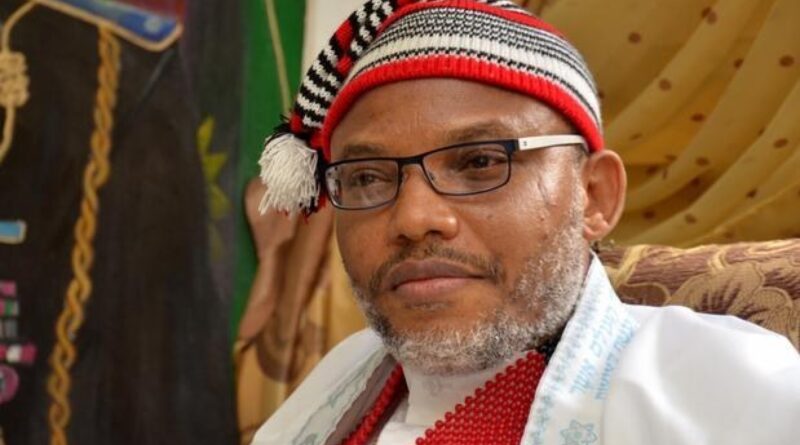Nigeria: Supreme Court Orders Continuation of Biafra Leader Nnamdi Kanu’s Trial
The judgement also implies an effective reversal of the previous decision of the Court of Appeal ordering the release of Mr Kanu from detention.
The Supreme Court on Friday ordered the continuation of the trial of Nnamdi Kanu, leader of the Indigenous People of Biafra (IPOB) over terrorism charges.
The trial which started in 2015 had been put on hold at the Federal High Court in Abuja after the Court of Appeal in Abuja dismissed the charges in a judgement delivered in October 2022.
A five-member panel of the Supreme Court led by Kudirat Kekere-Ekun declared Mr Kanu’s forcible repatriation from Kenya to Nigeria in June 2021 illegal.
However, a member of the panel, Tijjani Abubakar, ruled in the court’s lead judgement that there is no Nigerian law that prohibits “illegally obtained evidence for the trial of a defendant.”
The lead judgement of the Supreme Court was prepared by Mr Abubakar but read on his behalf by Emmanuel Agim.
“The Court of Appeal was wrong to say that the Federal High Court can no longer try Mr Kanu,” the court held.
“The appeal is allowed and the cross-appeal is dismissed.”
In the unanimous decision, the Supreme Court said Mr Kanu’s forcible repatriation from Kenya in June 2021 by the Nigerian government did not rob the trial court of jurisdiction to entertain the IPOB leader’s trial.
“Our law is that evidence illegality obtained is valid before the court. A violation of Mr Kanu’s right should have been by way of civil proceedings. That is not our law for now,” Mr Abubakar declared.
He also ruled that there is no legislation that provides in Nigeria that trial should stop where the prosecution does something illegal against the defendant while standing trial. “There is a civil remedy,” Mr Abubakar said.
The judgement also implies an effective reversal of the previous decision of the Court of Appeal ordering the release of Mr Kanu from detention.
Background
The Nigerian government had repatriated Mr Kanu from Kenya after the Federal High Court in Abuja ordered the IPOB leader’s arrest for jumping bail in 2017.
Mr Kanu was being tried before Binta Nyako of the Federal High Court in Abuja, for terrorism.
The Court of Appeal in Abuja, on 13 October, 2022, dismissed the terrorism and treasonable felony charges filed against Mr Kanu on the basis of his agitation for the secession of a Biafra Republic, comprising the five South-east states and parts of neighbouring states, from Nigeria.

Sign up for free AllAfrica Newsletters
Get the latest in African news delivered straight to your inbox
A three-member panel of the appellate court led by Oludotun Adefope-Okojie, dismissed the terrorism and treasonable felony charges against Mr Kanu.
The court had ordered Mr Kanu’s release from detention after striking out a seven-count charge pending before Binta Nyako of the Federal High Court in Abuja.
Mr Adefope-Okojie held that Mr Kanu’s forced return from Kenya to Nigeria in June 2021 was a breach of local and international laws.
But, instead of complying with the appellate court’s decision ordering Mr Kanu’s unconditional release, the office of the Attorney-General of the Federation (AGF) filed an appeal at the Supreme Court.
The then AGF, Abubakar Malami, filed an application for a stay of execution of the Court of Appeal’s verdict on the separatist leader.
But on 28 October 2022, another three-member panel of the Court of Appeal headed by Haruna Tsammani, halted the execution of its judgement which freed Mr Kanu of terrorism charges.
The government had applied that the execution of the judgment be suspended pending the resolution of its appeal filed at the Supreme Court.
Mr Tsammiani, in the ruling, held that the counter-affidavit filed against the government application by Mr Kanu’s legal team led by Mr Ozekhome was misleading.
Mr Kanu has been leading secession campaigns of South-east region parts of South-south Nigeria for an independent state of Biafra.
The federal government has consistently blamed IPOB’s separatist activities for the violence in the Southeastern region of the cost.
Mr Kanu, the IPOB leader, has been in SSS detention since June 2021 when he was repatriated from Kenya to Nigeria.
He was first arrested in 2015 under the administration of former Nigerian President, Muhammadu Buhari.

